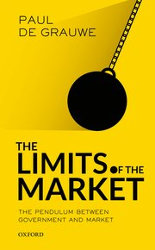 LEX Copyright Iroda |
|||
| E-mail: lexcopy@lexcopyright.hu – írjon nekünk! | |||
| Céginformáció | Újdonságok | Szerzőink | |
| Képviseleti lista | In English | ||
THE LIMITS OF THE MARKET: The Pendulum Between Government and Capitalism

Examines the tension between the free market and the state
Accessible, jargon-free, and suitable for anyone concerned with the direction the economy is taking
Covers key issues such as climate change and rising income inequality
Discusses the limits of the market and the rise and fall of capitalism
Asks to what extent the market should create welfare or whether welfare is the responsibility of the government
Will the financial crisis and growing inequality mark a new turning point in the balance of power between the free market and government? Are we about to witness the overthrow of capitalism, and will the state resume control?
In The Limits of the Market, leading economist Paul De Grauwe examines why a healthy mix of market and state seems so difficult. Periods in which the free market gains in importance inevitably alternate with periods in which the government takes control. The turning points in this eternal pendulum motion typically seem to coincide with disruptive events that put the limits of market and state to the test.
Today, after decades of triumph, capitalism is well on its way to destroying itself and allowing the government take the lead, warns De Grauwe. Key issues such as climate change and rising income inequality illustrate the inevitable external and internal limits of the market. Only the government seems to be able to offer a solution. But the state will also hit limits and, in turn, pave the way for a market comeback.
With his new book, Flanders’ most prominent economist makes an invaluable contribution to the debate on the sustainability of our market system. De Grauwe analyses in great detail the internal and external limits of the market and the government. He also devotes considerable attention to Thomas Piketty’s explosive insights into income inequality. In order to break out of this disastrous pendulum swing, De Grauwe calls for international cooperation on issues such as climate change and the introduction of a wealth tax. A difficult task, to be sure, but postponement only increases the chance of a dangerous implosion.
| 1054 Budapest, Szemere u. 21. Tel: (06-1) 332-9340 Fax: (06-1) 331-6181 | |||
| Info | |||